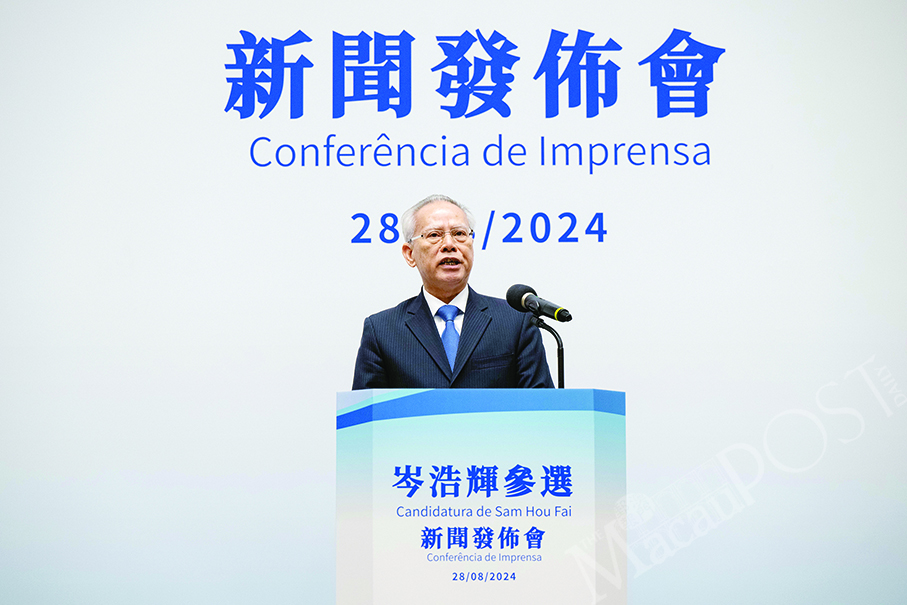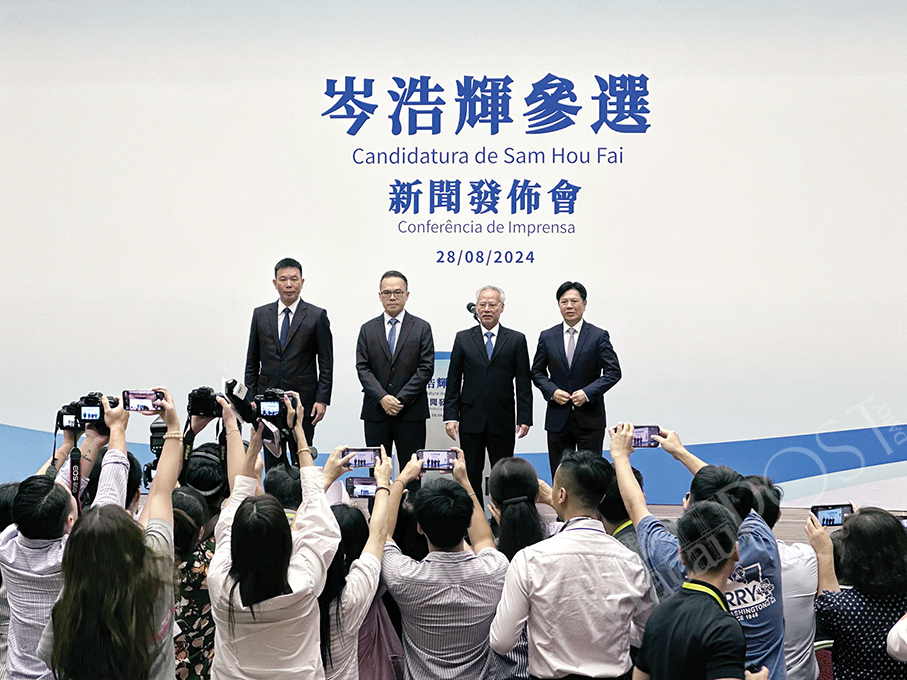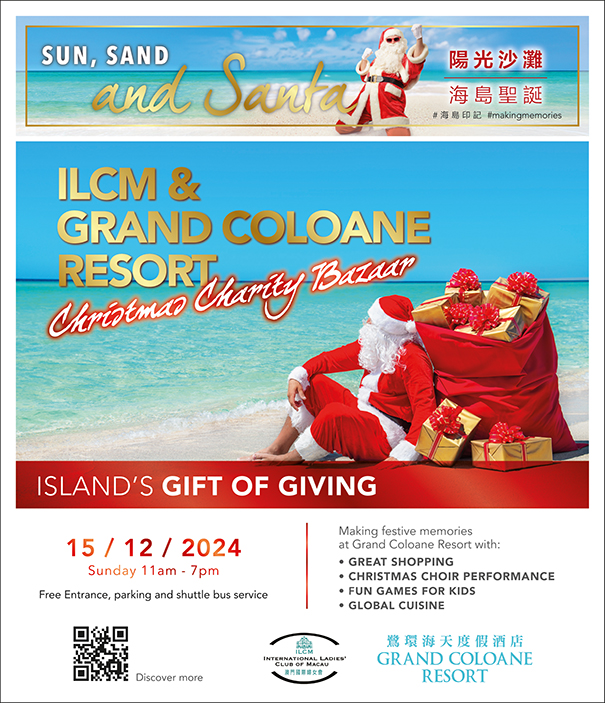‘Macau’s long-term development depends on nation’s support’
With only 46 days left until the polling day of the sixth-term chief executive election on October 13, Sam Hou Fai, the former president of the Court of Final Appeal (TUI) who revealed last week that he was considering running in the election, formally announced at a press conference yesterday his candidacy for the position of the Macau Special Administrative Region’s chief executive (CE), putting forward his philosophy of administration of “forging ahead together by upholding fundamental principles and breaking new ground”.
During the one-hour press conference at the Macau Science Centre in Nape, Sam underlined that Macau’s long-term development could not be achieved without the nation’s support and, therefore, with the nation’s reform and opening-up by adopting the new era’s economic development strategy, Macau must take timely measures to seize the opportunity and follow the pace of the nation’s development: “In the past 25 years, Macau has undergone tremendous changes in terms of its total economic output, the income of its residents, employment security and social welfare, which is a ‘non-disadvantageous’ development thanks to the implementation of a unique political institutional arrangement in the Macau Special Administrative Region (MSAR), that is, the high degree of autonomy given to us by the nation under the ‘One Country, Two Systems’ principle, which is further proof of the fact that we, as a part of our country and our motherland, have to seize the great opportunities of fully integrating into the nation’s development, making use of the advantages of the ‘One Country, Two Systems’ principle to serve and deepen the progress of the nation’s reforms and opening-up by taking advantage of the blending of Chinese and Western cultures”.
Sam went on to emphasise the need for “upholding fundamental principles and breaking new ground” in Macau: “In the face of challenges and difficulties encountered in the course of development, Macau should insist on reform and opening-up to stimulate social development and integrate into the overall situation of the nation’s development, recognising its own regional advantages and giving full play to its positioning as the ‘One Centre, One Platform and One Base’ to contribute to the nation’s development”.
Macau’s former chief judge added that in the past 25 years since Macau’s return to the motherland, the “One Country, Two Systems” principle has advanced to the middle stage and social development has entered an important phase, facing many challenges and contradictions, including natural disasters, the COVID-19 pandemic and changes in the international political environment in recent years. Sam also said he believed that it was necessary for Macau to reform and open up as well in order to achieve new breakthroughs in development.
Considering that Macau includes the Macanese community, Sam pledged that Macau will continue to protect the rights and interests of the Macanese community in accordance with the law, respecting its traditions, customs and culture, and at the same time, continue to make use of the position of “One Centre, One Platform, One Base” to create a better environment and opportunities for its development: “The Macanese community is an important part of Macau’s society and a manifestation of Macau’s uniqueness, and they have made significant contributions to Macau’s development”.
According to previous statements by the local government, the central government has granted Macau the positions of “One Centre, One Platform and One Base”, namely a “World Centre of Tourism and Leisure”, a “China-Portuguese-speaking Countries Commercial and Trade Service Platform”, and an “Exchange and Cooperation Base with Chinese Culture as its Mainstream and Coexistence of Different Cultures”, to bolster the city’s appropriate economic diversification and sustainable growth.
The Macanese community is estimated by observers to account for about 2 percent of Macau’s population. Customarily, the term “Macanese” refers to local-born residents of mixed Portuguese and Asian extraction or upbringing, as well as the community’s diaspora.
Sam’s 5-point philosophy of administration
Sam delivered at the press conference his manifesto on his candidature for the sixth-term chief executive post, putting forward a five-point philosophy of administration, the first of which includes the accurate implementation of the “One Country, Two Systems” principle, stressing the importance of the central government’s jurisdiction over Macau and the autonomy Macau enjoys, and that neither of the two should be neglected.
Secondly, to capitalise on the advantages of “One Country, Two Systems” in order to deepen ties and exchanges with other countries and regions, especially Portuguese-speaking and Southeast Asian countries, with a view to transforming Macau into an international metropolis and attracting top talents from all over the world. He also mentioned the need to speed up the integration into the overall situation of the nation’s development, and to spare no efforts in promoting the appropriate diversification of the local economy and fostering the development of the Guangdong-Macau In-depth Cooperation Zone in Hengqin, as well as in building “law-based Macau”, pushing forward innovative changes in the public administration and enhancing the level of scientific decision making.
‘Many Macau residents recognise me as long-time Macau resident’
As a native of Zhongshan City in Guangdong Province who moved to Macau in 1986, Sam, 62, said that although he has not been a prominent figure in society, he has started his family in Macau, and his children and grandchildren were born in Macau, with three generations living in Macau, “I believe that many Macau residents recognise me as a long-time Macau resident”, adding that he has travelled around Macau, including its narrow streets and alleys, and his knowledge of markets and supermarkets is no worse than that of many well-known people.
With nearly 40 years of experience in Macau’s judicial system, including serving as the president of the Court of Final Appeal for nearly 25 years, Sam pointed out that the biggest reform of Macau’s judicial system after its return to the motherland was the handing over of the judicial administration, which was previously the responsibility of the local government, to the courts themselves, adding that he set up a central court office, which, under the law, consists of three parts, namely judges, judicial staff, and public servants responsible for administrative and financial affairs, with different requirements and benefits for each group, similar to a “comprehensive small-scale government”.
‘It is necessary to promote economic diversification’
Sam, who has no business background, underlined yesterday that “no matter how difficult or tough the situation may be, it is necessary to promote economic diversification, and there is no turning back”, adding that “economic diversification is a must-answer question” which is not only a requirement by the central authorities, but also a consensus of the local community: “The tourism and gaming industry has seen disorderly development and wild expansion, not only crowded social resources, but also affected the career development of young people – one industry only is not conducive to the long-term development of Macau, and has a very large negative impact”.
In the future, Sam said, his team will also reach out to the community and the business sector, especially small- and medium-sized enterprises (SMEs), to jointly study and explore how to change their business models and concepts and innovate their business practices and methods: “We cannot change the general trend of society, but we can follow the trend to develop and improve our competitiveness”.
At the press conference, Sam also announced the members of his campaign office, including his election campaign trustee Lei Wun Kong, president of the Macau Legal Promotion Association; office head Ip Sio Kai, a member of the Macau Legislative Assembly (AL) and chairman of the Macao Bankers’ Association and a member of the National Committee of the Chinese People’s Political Consultative Conference (CPPCC); and deputy office head Chan Ka Leong, president of the General Union of Neighbourhood Associations of Macau (commonly known as Kai Fong).
The nomination period for the sixth-term chief executive election begins today and runs until September 12, indicating that Sam has two weeks to be endorsed by at least 66 members of the 400-member Macau Chief Executive Election Committee, or 16.5 percent of its total number of electors, to formally launch his bid to become Macau’s sixth-term chief executive.
Meanwhile, Sam’s election campaign office announced yesterday afternoon that his election campaign trustee will collect his nomination form from the Public Administration Building on Rua do Campo at 9:30 a.m. today.
If, as widely expected, elected Macau’s next chief executive, Sam would be the special administrative region’s first head of government not born here. However, he would be the first to be fluent in Portuguese, one of Macau’s two official languages, alongside Chinese.
While Sam would be the first judge to head the Macau SAR, Macau’s first- and second-term chief executive (Edmund Ho Hau Wah) was a chartered accountant and certified auditor, while third- and fourth-term chief executive (Fernando Chui Sai On) studied public hygiene and public health in the US and worked a school principal. Current chief executive Ho Iat Seng was a businessman before he became Macau’s fifth-term chief executive nearly five years ago.

Sam Hou Fai announces his candidacy for the sixth-term chief executive election during yesterday’s press conference at the Macau Science Centre in Nape. – Xinhua

Members of the Sam Hou Fai Election Campaign Office, including Chan Ka Leong (from left to right), president of the General Union of Neighbourhood Associations of Macau; Lei Wun Kong, president of the Macau Legal Promotion Association; Sam Hou Fai; and Ip Sio Kai, a lawmaker and chairman of the Macao Bankers’ Association as well as a member of the National Committee of the Chinese People’s Political Consultative Conference (CPPCC), pose after the one-hour press conference. – Photo: Yuki Lei





